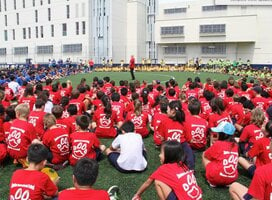Teach English in Singapore
With a diverse population, and a high standard of living, teaching in Singapore has gained popularity over the years. This beautiful country’s warm tropical climate, safe environment, and comprehensive list of benefits make it a popular destination for many ESL teachers. An English teacher's monthly salary in Singapore is between $2,200-3,050 USD.
Interested in how to become a teacher in Singapore? We’ve got you covered! Keep reading to learn more about teaching jobs, average salaries and benefits, and how to get a teaching job in Singapore!
In most teaching establishments, your work schedule will be around 20-25 hours per week, plus time for prep. Wondering which type of teaching job is right for you? Compare these types of teaching jobs in Singapore:
Private language academies/schools
These institutions usually require their teachers to be native English speakers, but they do give you the option of teaching other languages as well. You should be prepared to teach one-on-one lessons or in small groups and ensure that your curriculum is updated. The schools themselves are usually quite large and have their own premises, but they also sometimes offer classes at the students' homes. Although the pay may not be as high as in other places, there is the additional benefit of being able to work with a smaller number of students at any given time. Private language schools tend to have flexible schedules, so this is a great place to start if you want a full-time career in Singapore.
International schools
At an international school, you will usually teach children from several different countries living there with their parents or on expat packages. This type of position requires teaching licenses specific to the country where they work, so if your country doesn't recognize yours as valid, it might not be suitable for you.
To teach in an international school, you will need a college or university degree in English Language or Literature and a post-graduate diploma in education. Having a master's would allow you to stand out, but it is not necessary. Competition for these jobs is high, and the salary is also higher than in public schools/language centers. Many applicants will be as highly qualified as you are, so that that previous experience will set you apart. A quick Google search will give you a listing of Singapore's many international schools and opportunities. Examples of such schools are the Singapore American School, Overseas Family School, and Australian International School
Public school
These government-run schools offer students education through the medium of English. Public school teachers are required to have a Bachelor's degree in education or related subjects like English or linguistics.
You will likely apply through the Ministry of Education or speak directly to the school to teach in a public school. Applying through the Ministry of Education will give you a lower salary than international schools, but with excellent terms and conditions, including an average salary of around $2,200 USD a month, medical insurance, return flights, and a generous housing allowance. In addition, you can consider applying directly to schools that offer free accommodation and medical insurance.
Private lessons
Private English tutors are common in Singapore, although students can already learn English through their schools. Unfortunately, information on the market rate for tuition fees is difficult to find but is likely not as high as private language schools. However, the perks of being a private tutor are that this can be your part-time job!
An average English teacher salary in Singapore is between $2,200-3,050 USD a month, which will enable you to lead a comfortable lifestyle, possibly saving up to USD $500 above the cost of living.
Common benefits included for teachers
Common benefits included for teaching jobs in Singapore include:
- Medical insurance
- Pension fund
- Teaching material allowance (TMA) or reimbursement of school fees paid by the teacher as part of the salary package.
- Free accommodation is available either on-campus or off-campus, depending on the school you choose to teach.
- Social security coverage is provided by CPF (Central Provident Fund) and Medisave accounts that allow you to save up to 50% of your income every year towards retirement or medical expenses, respectively.
- Paid holidays range from 1 week to 2 weeks depending on your total years of working experience with specific companies/schools.
- Paid sick leave
Read more: How Much Money Can You Save Teaching Abroad?
Cost of living in Singapore
You will find that the pay for teaching jobs in Singapore is higher than in other countries, although the cost of living is higher as well, at $2100- $2500 USD.
However, as with all countries, there are numerous ways to cut costs by living the local lifestyle. For example, eat out at local hawker centers (where you can find the cheapest and, ironically, the best food for only USD $2-3) and take public transportation (super efficient, no worries about getting to work late!) over buying a car.
Additionally, your employer will assist you in finding accommodation. The high standards of excellence that Singapore holds will ensure that you have a seamless and organized teach abroad experience.
- Food: $294 USD per grocery trip
- Transportation: $90 USD/month
- Entertainment (movies, bars/clubs, etc.): $68 USD/ea time going out
- Housing: $2,220 USD/month
Source: Numbeo
Where and how to find housing
Housing is a significant concern for any teacher, especially in the early days of your stay in Singapore. There are many options for housing for teachers in Singapore, some more desirable than others. The best time to look for housing is at least one month before your start date.
Rental prices vary depending on location but expect them to start around $1,200 per month for studio apartments up towards $3,000 - $4,000 per month plus utility fees if these aren't included within rent payments already made each month.
The island is divided into three main regions: the central region (including downtown and Chinatown), the north region (including Little India), and the south region (including Little Italy). In addition, seven main cities make up the rest of Singapore: Jurong East, Woodlands New Town; Bukit Batok; Bukit Panjang; Choa Chu Kang; Yishun New Town; Hougang New Town; Serangoon Garden Estate.
If you want to live in a more local neighborhood than a cosmopolitan, you should consider teaching English in Jurong East or Yishun. On the other hand, if you're looking for a more eclectic crowd that's still close to the city center, Butik Batok is an excellent choice.
If you can move into one of these areas while still taking public transportation every day—or if your employer will pay for housing—then we recommend checking out Pulau Ujong or Tampines!
Where to find English teaching jobs in Singapore
There are many online resources for English teaching jobs in Singapore. For example, the go Overseas teach abroad job board lists many companies that offer job openings and free resources for teachers to help them prepare for their new jobs. You can also read through Go Overseas community alumni reviews of programs such as Teach Away, ITTT TEFL, and many others.
When to apply to teaching jobs in Singapore
The academic year starts in March or April and ends in December. Schools are on holiday from July to September, except for those which run an additional school term during this period (such as international schools).
An important thing to remember is that schools are closed for national holidays, so if you apply right before National Day (August 9) or Chinese New Year (February 7), you might get a delayed response because there will be no one there!
Singapore teacher qualification
English teachers need a bachelor’s degree to teach in Singapore, and a TEFL certification is required. Qualifications are highly emphasized in Singapore, so the more qualifications and credentials you have, the better. Most international schools and governments require you to sign a two-year contract. If you leave a government position for a private one, the government department responsible for issuing the visa for your next position may not be sympathetic.
Read more: What are the Requirements to Teach English Abroad?
Work visa
If you want to work legally in Singapore, you’ll need a work visa. You can apply for one of three kinds:
- Employment Pass (EP). This visa is often called the “gold standard” of work visas, allowing holders to stay in Singapore for two years and take on any job. You have to have a university degree or equivalent experience.
- S Pass. The S Pass works like an EP, but it has some restrictions—for example, holders must earn at least $2,000 per month and hold a bachelor's degree from an approved institution. It also lasts for six months instead of two years for an EP holder.
- Work Permit (WP). This one lets you stay in Singapore only long enough to complete your contract period—and maybe not even that long if your employer changes their mind about hiring foreigners!
As an ESL teacher in Singapore, it’s essential that you take the time to research the country’s etiquette and classroom culture, as it can be vastly different from what you’re used to at home! ESL teachers should be respectful and understanding while adapting to a new classroom environment.
Classroom & work culture
- Hierarchy is important in Singaporean society, and introductions are always done according to age or status. Always be respectful and courteous, and remember that personal relationships are the cornerstone of all business relationships.
- The hierarchy of a teacher-student relationship is apparent in most classrooms, and students will be obedient and follow classroom regulations (such as raising one’s hand before speaking).
- You may find people to be relatively soft-spoken – indeed, a calm demeanor is superior to a more aggressive style.
Note that younger individuals may be less traditional, so these rules vary from person to person. The safest thing to do is always be wary and observant of those around you. By noticing the safest norm, you can be culturally sensitive and avoid awkward situations.
Culture & etiquette tips
In Singapore, it's essential to show respect for local customs and traditions. The best way to learn about them is by observing the behavior of those around you. Here are a few things you should avoid:
- Littering
- Touching or pointing at people
- Staring at people, especially in public places like on the MRT or bus (the mass rapid transit). This is considered extremely rude.
Start researching and comparing teaching programs here at Go Overseas in the Teaching Programs in Singapore section below.
Want to read more? Get started with these articles:



















